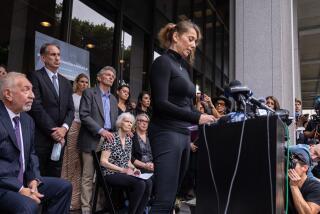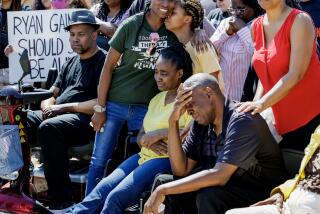Family Will Fight Verdict in O.C. Racial Killing
- Share via
The parents of a Laguna Hills teenager murdered by a neighbor in a fit of racial hatred vowed Monday to seek a way to overturn a judge’s ruling that their son’s killer was legally insane.
“The trial is over, but the outcome sent out the wrong message ... [that] if you’re a racist and mentally ill, it’s OK to kill,” said Christopher Chiu, who along with his wife, Minnie, and their lawyer announced a plan to challenge the verdict.
The couple’s 17-year-old son, Kenneth, was stabbed to death June 30, 2001, by neighbor Christopher Hearn.
Hearn, 22, told investigators he was proud of the stabbing, that he acted like a Marine and klansman. Psychiatric experts hired by the defense testified that Hearn, who can neither hear nor speak, was schizophrenic and believed he had orders from the government to kill dangerous people.
Orange County Superior Court Judge Kazuharu Makino, who presided over a nonjury trial, convicted Hearn last month of first-degree murder. But Makino later found that Hearn could not tell right from wrong when he killed Chiu and thus was not guilty by reason of insanity.
“I don’t want anyone thinking this is absolving anyone,” Makino said at the time. “The question is, was he sane or insane based on the legal standards that we use?”
The Chius want the murder conviction to stand, because Hearn would be sentenced to life in prison.
Experts say that being found legally insane is tantamount to an acquittal because Hearn will instead be treated at a state psychiatric facility until he is no longer deemed a threat.
In the Chius’ first public appearance since the verdict, they lashed out at Makino.
“The judge is one-sided.... We thought we [could] trust the American justice system,” Christopher Chiu said. “After the outcome of the trial, justice is not there for my son and my family.”
The couple’s attorney, Rose W. Tsai, said she will look for a “procedural” error by the judge during the trial so Hearn’s first-degree murder conviction can be reinstated -- though she noted that challenging the decision would be very difficult.
Robert Pugsley, a professor at Southwestern University School of Law in Los Angeles, was even less optimistic. He said the family has no legal standing in the criminal case and thus no recourse. And prosecutors would have no avenue for appeal -- on procedural or any other grounds -- because overturning a not-guilty verdict would violate the defendant’s constitutional right against double jeopardy.
“Once you’ve been tried,” Pugsley said, “that’s the end of the story, under our system, however outrageous or erroneous that may feel to the affected family or the public.”
Pugsley said the only legal recourse left for the Chius is to file a wrongful-death lawsuit against Hearn. It may bring some emotional closure for them, even if they are not likely to collect any monetary damages from Hearn, he said. “And insanity is not a defense in civil court.”
But Tsai said she hopes that pressure from the Asian community will persuade the Orange County district attorney’s office to appeal Makino’s ruling that Hearn was legally insane. District attorney’s officials could not be reached for comment on the case Monday.
Although prosecutors have said Hearn is unlikely to ever be freed, Christopher Chiu isn’t so sure. He wants the Legislature to change the law to allow the feelings of a victim’s family to be considered when decisions are made whether someone like Hearn is ready for release.
Tsai said the family wants the Assembly to “make how a family feels a relevancy issue and allow them to speak out” on the prospect of releasing Hearn.
Joining the family’s news conference on a speaker phone was Assemblywoman Judy Chu (D-Monterey Park), who said she plans to hold hearings in Orange County before the end of the year to investigate Chiu’s death.
Chu, chairwoman of the Assembly Select Committee on Hate Crimes, called Makino’s ruling “disturbing.” Among the issues the panel would study, Chu said, is the criminal justice system’s failure to provide psychiatric treatment for those who commit hate crimes but are found legally insane.
*
Times staff writer Daniel Yi contributed to this report.
More to Read
Sign up for Essential California
The most important California stories and recommendations in your inbox every morning.
You may occasionally receive promotional content from the Los Angeles Times.










